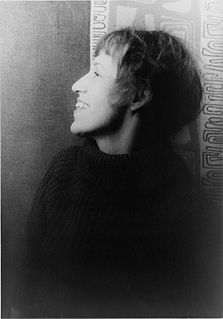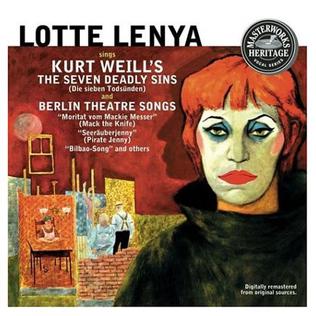
Rise and Fall of the City of Mahagonny is a political-satirical opera composed by Kurt Weill to a German libretto by Bertolt Brecht. It was first performed on 9 March 1930 at the Neues Theater in Leipzig.

The Threepenny Opera is a "play with music" by Bertolt Brecht, adapted from a translation by Elisabeth Hauptmann of John Gay's 18th-century English ballad opera, The Beggar's Opera, and four ballads by François Villon, with music by Kurt Weill. Although there is debate as to how much, if any, Hauptmann might have contributed to the text, Brecht is usually listed as sole author.

Kurt Julian Weill was a German composer, active from the 1920s in his native country, and in his later years in the United States. He was a leading composer for the stage who was best known for his fruitful collaborations with Bertolt Brecht. With Brecht, he developed productions such as his best-known work, The Threepenny Opera, which included the ballad "Mack the Knife". Weill held the ideal of writing music that served a socially useful purpose, Gebrauchsmusik. He also wrote several works for the concert hall and a number of works on Jewish themes. He became a United States citizen on August 27, 1943.

Marianne Evelyn Gabriel Faithfull is an English singer and actress. She achieved popularity in the 1960s with the release of her hit single "As Tears Go By" and became one of the lead female artists during the British Invasion in the United States.
"Mack the Knife" or "The Ballad of Mack the Knife" is a song composed by Kurt Weill with lyrics by Bertolt Brecht for their 1928 music drama The Threepenny Opera. The song has become a popular standard recorded by many artists, including a US and UK number one hit for Bobby Darin in 1959.

Lotte Lenya was an Austrian-American singer, diseuse, and actress, long based in the United States. In the German-speaking and classical music world, she is best remembered for her performances of the songs of her first husband, Kurt Weill. In English-language cinema, she was nominated for an Academy Award for her role as a jaded aristocrat in The Roman Spring of Mrs. Stone (1961). She also played the murderous and sadistic Rosa Klebb in the James Bond movie From Russia with Love (1963).
The "Alabama Song"—also known as "Moon of Alabama", "Moon over Alabama", and "Whisky Bar"—is an English version of a song written by Bertolt Brecht and translated from German by his close collaborator Elisabeth Hauptmann in 1925 and set to music by Kurt Weill for the 1927 play Little Mahagonny. It was reused for the 1930 opera Rise and Fall of the City of Mahagonny and has been recorded by the Doors and David Bowie.

The Seven Deadly Sins is a satirical ballet chanté in seven scenes composed by Kurt Weill to a German libretto by Bertolt Brecht in 1933 under a commission from Boris Kochno and Edward James. It was translated into English by W. H. Auden and Chester Kallman and more recently by Michael Feingold. It was the last major collaboration between Weill and Brecht.

Happy End is a three-act musical comedy by Kurt Weill, Elisabeth Hauptmann, and Bertolt Brecht which first opened in Berlin at the Theater am Schiffbauerdamm on September 2, 1929. It closed after seven performances. In 1977 it premiered on Broadway, where it ran for 75 performances.

LoveMusik is a musical written by Alfred Uhry, using a selection of music by Kurt Weill. The story explores the romance and lives of Kurt Weill and Lotte Lenya, based on Speak Low : The Letters of Kurt Weill and Lotte Lenya, edited and translated by Lys Symonette & Kim H. Kowalke. Harold Prince had read Speak Low and suggested the idea for a musical to Uhry. Uhry and Prince worked on LoveMusik for four years to develop it into a stage work. The story spans over 25 years, from the first meeting of Lenya and Weill as struggling young artists, to their popularity in Europe and America, to Weill's death from a heart attack at age 50.

Mahagonny, ein Songspiel, or Mahagonny, a song-play, was written by composer Kurt Weill and dramatist Bertolt Brecht and first performed with that title and description in 1927. Elisabeth Hauptmann contributed the words to two of its songs. Just under half an hour in length, the work can be thought of as a staged or scenic cantata. By the end of 1929, however, Mahagonny had grown into a two-hour opera with the title Aufstieg und Fall der Stadt Mahagonny, or Rise and Fall of the City of Mahagonny. This was premiered in March 1930. Today the cantata and the opera are considered separately, the latter holding a place in the repertory, the former being an occasional piece staged in small theaters or programmed as an outgrowth of a song recital when resources permit. For this reason the shorter work is informally referred to as Das kleine Mahagonny, or The Little Mahagonny, or as Mahagonny-Songspiel.
"When the Ship Comes In" is a folk music song by Bob Dylan, released on his third album, The Times They Are a-Changin', in 1964.
"Pirate Jenny" is a well-known song from The Threepenny Opera by Kurt Weill, with lyrics by Bertolt Brecht. The English lyrics are by Marc Blitzstein. It is probably the second most famous song in the opera, after "Mack the Knife".

The Threepenny Opera is a 1931 German musical film directed by G. W. Pabst. Produced by Seymour Nebenzal's Nero-Film for Tonbild-Syndikat AG (Tobis), Berlin and Warner Bros. Pictures GmbH, Berlin, the film is loosely based on the 1928 musical theatre success of the same name by Bertolt Brecht and Kurt Weill. As was usual in the early sound film era, Pabst also directed a French language version of the film, L'Opéra de quat'sous, with some variation of plot details. A planned English version went unproduced. The two existing versions were released on home video by The Criterion Collection.
Paul Trueblood was musical director/pianist for a variety of performers including Diane Keaton, Michael Feinstein, Julie Wilson, Carol Lawrence, Matthew Broderick, Anita Ellis, and Earl Wrightson and Lois Hunt. He was personal pianist for lyricist Alan Jay Lerner and director Joshua Logan. He wrote special material for Radio City Music Hall, Martin Charnin's Upstairs at O'Neal's, numerous cabaret performers, and two scores for the American Methodist Bicentennial A Church Is Born and Aldersgate 88. He appeared with Betty Comden and Adolph Green on Broadway and thereafter in many concert engagements.

The 1978 American premiere of the 1926 play Downfall of the Egotist Johann Fatzer took place November 9, 1978, Off-Broadway at the Shelter West Theatre Company. It was directed by W. Stuart McDowell, then Artistic Director of the Riverside Shakespeare Company of New York, where McDowell subsequently staged the New York premiere of another of Brecht's early plays, Edward II. This production was inspired by the first German production of two years before, but in no way attempted to copy that production, but rather endeavored to develop a production style more appropriate to Brecht's theatre work of the 1920s.
"What Keeps Mankind Alive?" is a song composed by Kurt Weill with lyrics by Bertolt Brecht for their music drama The Threepenny Opera which premiered in Berlin in 1928 at the Theater am Schiffbauerdamm. The title refers to the central line from the finale of act 2, Denn wovon lebt der Mensch?. In the opera, the two stanzas of the strophic piece are sung by Macheath and Mrs Peachum and the final line is sung in fortissimo by the chorus.

The Seven Deadly Sins is a studio recording of the Kurt Weill opera of the same name by British singer Marianne Faithfull, released in 1998.
Bertlies "Lys" Symonette was a German-American pianist, chorus singer and musical stage performer. In 1945 she took a job as rehearsal pianist, coach, understudy or multi-tasking "swing-girl" for The Firebrand of Florence, a Kurt Weill musical making its Broadway debut. This proved to be the start of a new career as Weill's musical assistant: from that point a principal focus of her professional life was on the composer and, more particularly after his early death in 1950, the career of his widow, the stage performer Lotte Lenya. When Lenya died, in 1981, Lys Symonette was appointed vice-president of the Kurt Weill Foundation, also serving as its "musical executive". When she died her friend and frequent collaborator, Prof. Kim H. Kowalke, published an affectionate tribute in which he described her as "the last and irreplaceable link to the inner artistic circle of Weill and Lenya".

Berlin to Broadway with Kurt Weill is a musical revue with a book by Gene Lerner, music by Kurt Weill, and lyrics by various songwriting partners Weill worked with over his career. The plot follows Weill's life as he begins his career in Germany writing the music for controversial musicals, through his journey fleeing Nazi persecution, immigrating to the United States, and becoming successful on Broadway. Songs featured include those Weill collaborated on with Maxwell Anderson, Marc Blitzstein, Bertolt Brecht, Jacques Deval, Michael Feingold, Ira Gershwin, Paul Green, Langston Hughes, Alan Jay Lerner, Ogden Nash, George Tabori and Arnold Weinstein.











